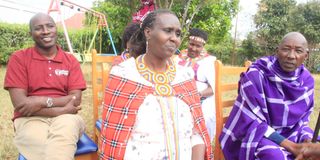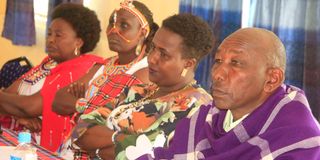Breaking barriers: How Samburu women found their voice in traditional courts

From left: Isaiah Biwott, executive director for CIPAF, Josephine Lemaletian, a secretary of the alternative justice system in Samburu County and Vincent Lempara, a member, during an interview in Kabarnet on November 14, 2024.
What you need to know:
- CJ Koome's insistence on including women in Samburu's Alternative Justice System has led to four women joining the traditionally male-only council of elders.
- Despite initial resistance, these pioneering women are now helping resolve disputes including land issues and even murder cases.
- Their inclusion has started changing attitudes throughout the community, with male elders now involving their wives in family decisions that were once exclusively male domains.
A quiet revolution is taking place in the heart of Samburu County. Women, traditionally relegated to the background in this patriarchal pastoralist community, are now finding their voices in resolving disputes and making decisions that affect their entire society.
When Chief Justice Martha Koome visited Maralal Law Court in Samburu Sub-County on August 26 last year, she did more than just commission the Alternative Justice System (AJS). She insisted on the inclusion of women in dispute resolution.
The move was revolutionary in a community where women's roles were strictly defined and limited. Out of the 19-member group that was constituted, 15 were men and only four were women, with a representative from each Sub-County – Samburu North, Samburu Central, Samburu East, and Samburu West.
"In the Samburu community, women were demeaned and they were not supposed to talk, let alone being involved in issues affecting the community," explains Veronicah Lekenit, one of the four women who now sit on the AJS group.
"Land issues, dowry negotiations and others were solved by men, and whatever decision they came up with had to be welcomed by the rest of the community."
Veronicah, who recently attended a two-day training organised by the Citizen Participation Forum (Cipaf) in Kabarnet town in Baringo Central alongside groups from Baringo, Nakuru, and Samburu counties, speaks with a quiet determination about the changes she's witnessing.
"Public barazas were also a no-go zone for women whose responsibilities were to take care of their homes and livestock, and not to go where men were gathered," she continues. "You can imagine being a mother and you cannot be involved in the dowry negotiation of your own daughter—that was purely a men's affair. Your role was only in preparing her for the ceremony, and your involvement ended there. In normal circumstances, mothers should be major participants and have a right to be involved."
The system, which the locals call Loip (under the tree court), has been transformative. In a community where women were once barred from public forums and decision-making spaces, they now sit alongside male elders, some old enough to be their fathers, to resolve community disputes.
Josephine Lemaletian from Maralal in Samburu Central, who serves as the secretary of the AJS and is the only woman incorporated as a council elder, recalls the initial tension when women first joined these meetings.
"Our first meeting was tense and uncomfortable because we were now sitting in the same forums with elders, some the age of our fathers, which was against our cultural norms," she says.
"But with time, we got used to it and we worked as a team. At first, the men were adamant about giving us roles, but we fought for our space and one of us became secretary, which to us was a milestone."
The women's presence was not just symbolic. They brought new perspectives to conflict resolution, particularly in cases involving domestic issues that had previously been swept under the carpet.
"We have also sensitised women that they should not bury their heads in the sand but instead air issues affecting them," Josephine adds.

From left: Mary Lempara, Josephine Lemaletian, Veronica Lekenit and Vincent Lempara all members of the alternative justice system in Samburu County during a forum at Kabarnet, Baringo Central on November 14,2024.
"Most of the cases we have solved are domestic issues, which used to be swept under the carpet because most of the victims were women and they used to fear reporting them to anyone. We are now happy that through the alternative justice system, such cases are reported and solved amicably. The women now do not fear, and they come to us."
The AJS has become a bridge between modern judicial processes and traditional dispute resolution. The system receives referral cases from the court, settles them according to community norms, and then provides feedback to the formal justice system.
One such case involved a 70-year-old man from Wamba village who had killed a young man.
"The suspect had been charged with manslaughter after killing his neighbour, and the court referred the case to the AJS," Josephine explains. "Both families agreed to settle the matter out of court, and we solved it amicably with both parties satisfied."
In the Samburu community, when someone kills another person, the punishment is a fine of "nine times nine livestock" (81 cows and goats), which is divided among the elders who resolved the case.
"They will also do a cleansing ceremony where the elders will strike one of the 81 cows, calling the name of the deceased person to appease his spirits," she adds. "The cows, which will be provided by the offender, are divided among the elders and the case is fully settled. That was what was done and the two parties left satisfied."
This approach not only respects traditional methods of conflict resolution, but also helps address issues of access to justice. Many in the community, facing barriers of illiteracy, distance, and lack of resources, were previously hesitant to engage with the formal court system.
"The AJS has also solved cases that used to go unreported because due to illiteracy, most of the people in the community used to believe that if they report an offender and he or she is arraigned in court, he would never come back, and no one will even follow up or present themselves in court as witnesses," Josephine notes.
"They now resonate with us because we can solve cases using the local language and also incorporate the aspect of culture. People now have the confidence to report any wrongdoing in the community. We have gone through numerous trainings and we know how to solve cases, which mostly are referrals from the court and we also have a record of the same for referrals."
The impact of women's involvement in the AJS extends beyond dispute resolution. It's changing deeply entrenched attitudes about gender roles in the community, even among the traditional male elders.
Vincent Lempara, an elder from Baragoi in Samburu North and a member of the AJS, acknowledges this shift: "Even when I wanted to sell my cow or goat, I didn't involve my wife who normally looks after them because she was not required to make any decision for me as her husband. The same also applied in dowry negotiations where the suitor would only approach the elders, and the woman to be married off and her mother would not be consulted."
"Her mother will only be informed that the suitor will come and should prepare her daughter for the marriage ceremony. She will not be on the negotiation table either," he adds, describing the old ways.
But now, Lempara represents a new generation of elders who are embracing change.
"Things are now changing. The retrogressive cultural practices that demeaned women are being addressed, thanks to the alternative justice system where women are also involved in dispute resolution and decision-making. Men in the community are now starting to appreciate and involve women in issues affecting the community. I also involve my wife when I want to make decisions in my family."
Isaiah Biwott, executive director for Citizen Participation Forum (Cipaf), emphasises the broader benefits of the AJS beyond gender inclusion.
"What we are doing as an organisation is to promote and assist in the justice program through inclusion of the use of alternative justice system programs, including the traditional dispute resolution mechanism," Biwott says. "Every community has a way of solving disputes, and this helps them solve disputes in a cheaper and faster way unlike the court process."
The success of the AJS is evident in concrete results.
"In Baringo County, the Court Users Committee (CUC) was awarded as the second best countrywide last year because most of the cases had been solved through AJS, reducing backlog in court," Biwott notes.
Biwott explains that his organisation works closely with various stakeholders, including the Judiciary, police service, and the Kenya Prison Service.
"We work with several actors to ensure that even those who have been imprisoned can still go and seek forgiveness from those they wronged, promoting harmony in the community."
Unlike the formal court system, where one party wins and the other loses, the AJS provides a win-win solution for both parties. However, certain cases—murder, defilement, and rape—remain within the jurisdiction of the formal justice system.
"Most civil cases and misdemeanours can be solved through an alternative justice system and that is what we are promoting. We have been training actors to do that in their respective communities, with the support of the judiciary and the office of the director of public prosecution (ODPP), on which cases to be solved locally and which ones to be referred to the main justice system," Biwott explains.
For the women of Samburu, the AJS represents more than just an alternative to courts. It's their opportunity to reshape a culture that has long silenced them.
"The AJS has helped us to participate in the community. We now have a voice," says Josephine. "The four of us have changed the perception that women are only supposed to run errands at home and take care of children. We have also given them confidence that women can also participate in major decisions affecting the community."




